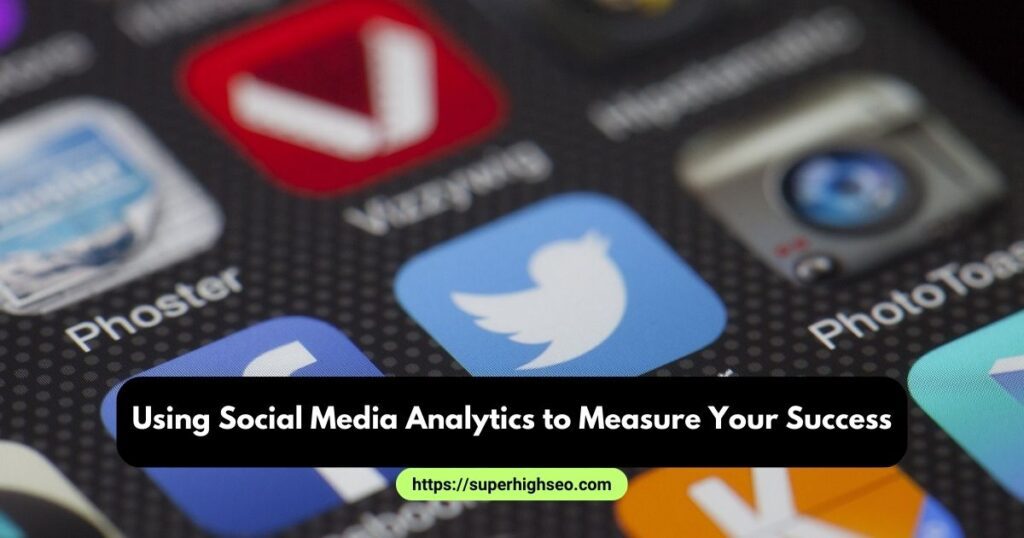
In today’s digital age, social media platforms have become a crucial aspect of business marketing strategies. Brands leverage social media platforms to engage with their audience, promote their products or services, and ultimately grow their business. However, using social media for marketing purposes is not just about posting content and hoping for the best. It requires a systematic approach to measuring success and adjusting strategies based on the results.
Social media analytics is the practice of collecting and analyzing data from social media platforms to measure the success of a brand’s social media efforts. This data can be used to make informed decisions about content creation, engagement strategies, and overall social media marketing goals.
In this article, we will discuss how social media analytics can be used to measure success on social media platforms and provide actionable insights to improve your social media marketing efforts.
Setting Social Media Goals
Before diving into social media analytics, it is important to define the goals of your social media marketing efforts. Social media goals should be specific, measurable, achievable, relevant, and time-bound (SMART). Some common social media goals include:
- Increasing brand awareness
- Driving website traffic
- Boosting engagement
- Generating leads and sales
- Building brand loyalty and customer relationships
By setting clear and specific goals, you can easily track progress and measure success using social media analytics.
Choosing Social Media Metrics
Once you have set your social media goals, the next step is to choose the right social media metrics to track. The metrics you choose should align with your goals and provide insight into the success of your social media marketing efforts.
Some common social media metrics include:
- Reach: The number of people who have seen your social media content.
- Impressions: The number of times your social media content has been seen.
- Engagement: The number of likes, comments, shares, and other interactions on your social media content.
- Clicks: The number of times users have clicked on links within your social media content.
- Conversion rate: The percentage of users who completed a desired action after clicking on a link within your social media content.
- Follower growth rate: The rate at which your social media following is growing.
- Customer lifetime value (CLV): The total value a customer will bring to your business over the course of their lifetime.
Measuring Social Media Success
Now that you have set your social media goals and chosen the appropriate metrics to track, it is time to measure your social media success using social media analytics tools.
Most social media platforms offer their own analytics tools, which provide detailed insights into how your content is performing. For example, Facebook Insights provides data on page views, post reach, engagement, and more. Instagram Insights offers similar metrics, including impressions, engagement rate, and follower growth.
In addition to platform-specific analytics tools, there are also third-party social media analytics tools available, such as Hootsuite Insights and Sprout Social. These tools provide a more comprehensive view of your social media performance across multiple platforms, allowing you to compare metrics and track progress over time.
Analyzing Social Media Data
Once you have collected social media data, it is important to analyze the data to gain insights into what is working and what can be improved. Here are some tips for analyzing social media data:
- Look for trends: Analyze data over time to identify trends and patterns in your social media performance. For example, are there specific types of content that consistently perform well, or are there certain times of day when your audience is most active?
- Identify top-performing content: Look at your top-performing content to identify what resonates most with your audience. Use this information to inform future content creation.
- Compare metrics: Compare metrics across different social media platforms and campaigns to identify what is working and what can be improved.
For example, if you’re running a social media campaign on both Facebook and Instagram, compare the engagement rates and reach of the same type of content on both platforms. This will give you an idea of which platform your audience is more engaged with and where you should focus your efforts.
Similarly, if you’re testing different types of content (such as images, videos, or infographics), compare the engagement rates and click-through rates of each type of content to see which type resonates most with your audience.
Comparing metrics can also help you identify which campaigns are most effective in achieving your social media goals. For instance, if your goal is to drive website traffic, compare the click-through rates and conversion rates of different campaigns to see which one is generating the most traffic and conversions.
Adjusting Social Media Strategies
The insights gained from social media analytics should inform your social media strategies moving forward. Use the data to make informed decisions about content creation, engagement strategies, and overall social media marketing goals.
For example, if your data analysis shows that your audience is most engaged with video content, prioritize video creation in your social media content strategy. If you find that a particular campaign is not generating the desired results, adjust your approach or try a different approach altogether.
In conclusion, social media analytics is a powerful tool for measuring the success of your social media marketing efforts. By setting clear goals, choosing the right metrics, and analyzing the data, you can gain valuable insights into your audience’s behavior and adjust your social media strategies accordingly. By regularly monitoring your social media performance and making data-driven decisions, you can optimize your social media presence and achieve your marketing goals.
Free WordPress Premium Plugins
Free WordPress Premium Plugins
Premium Accounts Cookies
Digital Marketing Guide: Read Our Articles
Digital Marketing Guide For Beginners
Benefits of Digital Marketing for Your Business
9 Common SEO Mistakes That Could Derail Your Rankings
